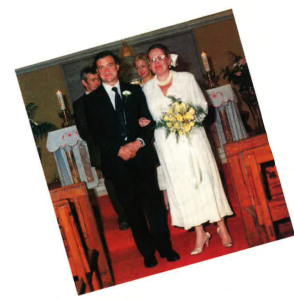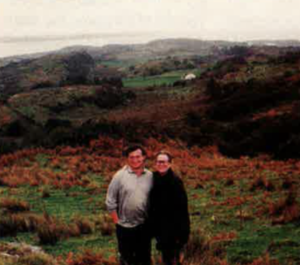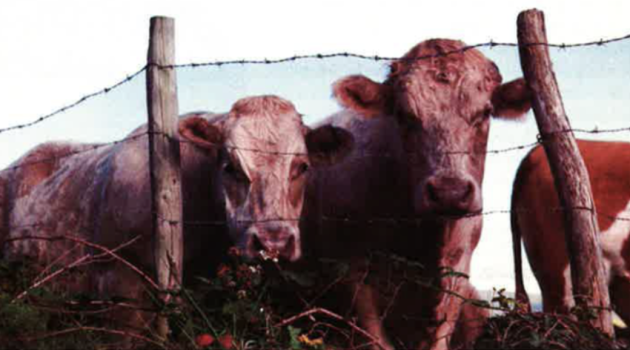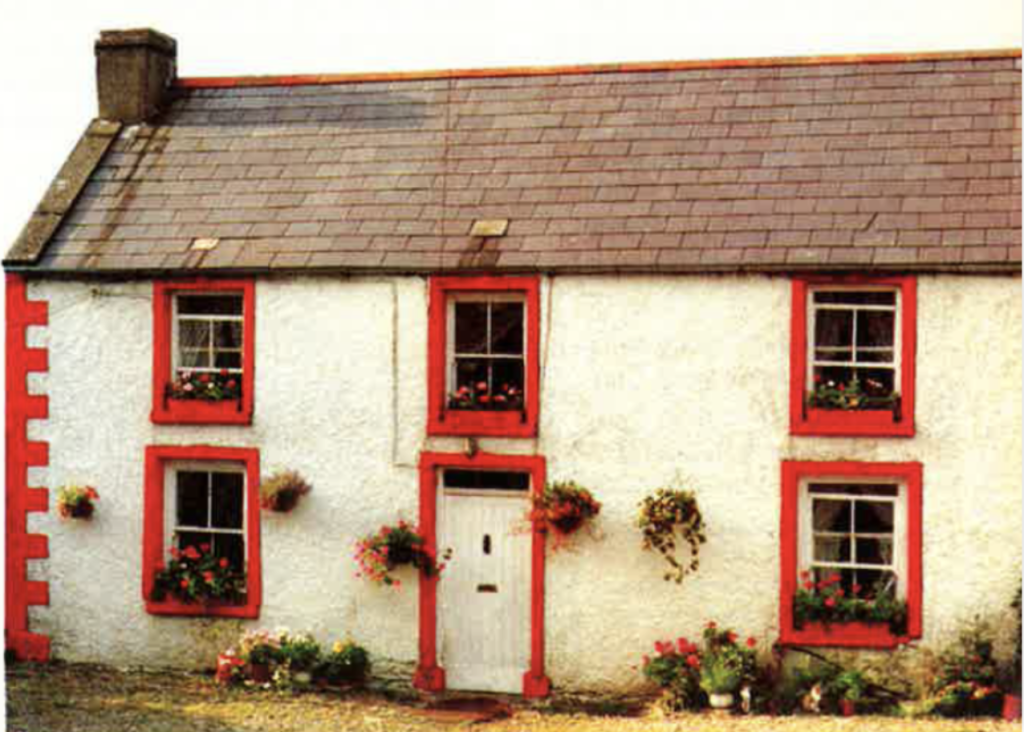Kathleen Tierney O’Connell, a third-generation Irish American and former editor at Vogue magazine, left the bright lights of Madison Avenue to be with the love of her life, Packie McFadden, a farmer in County Donegal.
As a third generation American with Irish forebears on both sides of the family tree, I was always curious about Ireland and even flirted briefly with the idea of attending Trinity College. Finally, an associate at work gave me the push I needed to spend a quick week’s holiday at her family’s farmhouse in glorious County Donegal.
By the end of that week I knew I had lost my heart to the country and the man I would eventually marry, and would never be able to call anywhere else home again.
It took two additional trips: one properly chaperoned by the mother of said associate — she was finally convinced that I could start a peat fire without burning her house down — and one on my own, to convince my future husband, Packie McFadden, that he felt the same way.
I had decided at the age of thirteen I would work for Vogue magazine and, at nineteen, I did. It was a tremendously exciting time. The sixties with all its frivolity contrasted with the seriousness of a generation of young people trying to end the war in Vietnam really made one feel totally alive. Yes, I went to Woodstock, and, yes, I was tear-gassed at the protests in Washington following the Kent State massacre. I had dated more than my share of corporate raiders, and had been to every new club, restaurant and show that New York had to offer. I even loved my job but was no longer totally obsessed by hem lengths and heel heights.

I had worked under the editorships of Diana Vreeland and Grace Mirabella, and when Anna Wintour came in to sweep the magazine clean I was one of the last to be offered a package to leave.
I was absolutely thrilled. My first phone call was to Packie, to ask him if he would like a visit from an unemployed woman with a large redundancy check in her pocket.
That was to be my last trip to Ireland before we were married and the true acid test. I stayed alone in my friend’s farmhouse. Packie had his farm to run and his mother to look after so I had a month to decide whether or not I was meant for life in the country. A run in with a rather sweet, but at the time, terrifying bat that flew into the house one night, and some poorly managed fires that left me frozen to the bed in the morning and filled the house with smoke during the day, did little to dampen my enthusiasm.
On afternoons when Packie could get away we went on drives, wonderful romantic drives to magical places like breathtaking Fintra beach, the stark mountains and boglands of Glengesh, the folk village of Glencolmcille with its Irish-speaking locals, and a lovely little hotel in Ardara called the Nesbitt Arms where we had the occasional “wee one” to sustain us, and where we eventually had our wedding reception.
The process of moving was easy, the process of leaving the United States was hard, very hard. I am an only child and spent most weekends with my parents in Westchester County which is 45 minutes north of New York City. I always considered myself incredibly lucky to have grown up in such a beautiful place with beaches and pine forests, lots of greenery. My parents live in a house that’s over a hundred years old. My fraternal great-grand-father who was born in Killmichael, County Cork, built it for my grandmother, and my dad was born in it. We’re avid gardeners and most summers saw over two hundred tomato plants sagging with fruit. Strangers would walk up our driveway to ask questions about our flowers and ask if they could take pictures of the occasional bloom.
Breaking up this close family unit was a difficult decision but I also had a small four-legged companion whom I had raised like a child and whose future had to be addressed. Booth is a West Highland white terrier. She was born on the night John Lennon died and came to live with me at the age of five weeks. Ireland has very strict laws which would have required her to be quarantined for six months. She’s never been in a cage in her life. Hence, she’s stayed with my folks but I miss her every day.
Packie and I now have a young, sweet Border Collie officially named Coile, which is Irish for pup, but more often than not he answers to “the boy”. Coile is supposed to be a working dog and he does earn his keep most of the time but sometimes he gets the program wrong and scatters sheep and cows in all directions. He is really a spoiled rotten pet with access to all furniture and beds in the house.
We live in a classic two-story farmhouse with a Blue Bangor plate roof, which was built by Packie’s grandfather in 1937. It’s high on a hill and looks out to the sea to a lighthouse on one side and the harbor of the fishing village of Killybegs on the other. During the Christmas holidays when all the boats are in port their lights make it look like a great city.

The fishing industry employs up to 90 percent of the local population at various times of the year. But try and find some fish to buy. Most of it is processed, either canned or frozen and shipped abroad.
This close proximity to the sea puts us directly in the path of whatever Mother Nature has on offer. The wind becomes a force that both frightens and exhilarates at the same time.
My first winter in Ireland saw a constant ten-plus gale-force wind blow from the end of October to the end of January. It terrified me so badly initially that I was afraid to leave the house but it now is a respected old friend. The thunder and lightning storms are another story and still scare the life out of me. Mostly because they cause power outages — the television will blink on and off a few times and then BOOM — you are plunged into darkness. Candles are more than an affected decoration on every mantelpiece in our house.
The weather in general is something I thought might affect me. I expected to fall victim to SAD (personally affected disorder) from lack of sunlight. But I’ve come to love the Irish climate for its unpredictability. It never does anything too long to get boring. It will rain, blaze sunshine, cloud over with mist, hail the size of golf balls, and that’s just in a time-span of two hours.
We own thirty acres around the house with endless areas I have yet to explore and one hundred acres of hilltop land with the ruins of an old Celtic church at the top. The first time Packie took me for a tour I was wearing my chic Donna Karan thong sandals. Boy, did I learn quickly about footgear. Ireland, in fact, must be the only country to redefine the term “terra firma.” No ground is as it seems to be, nor will it be the same tomorrow, nor was it yesterday. You may be walking through what you think to be a perfectly nice field and end up engulfed in gunge that threatens to encapsulate you to the top of your head. This happens to me at least once a week no matter how carefully I plan my expeditions.
Every Sunday, my inherited intense love of everything that grows, with the exception of the ubiquitous stinging nettle which lies in wait to attack me at every turn, takes me out to collect weeds and wild flowers for drying and fresh arrangements in old crockery jugs.
A friend who spent her childhood years in Lebanon once told me of hills covered in nasturtiums growing wild. I always thought she was exaggerating until I experienced my first Irish spring when drains at the side of every road exploded with clusters of primroses and opalis, followed by endless fields of bluebells and foxgloves. And wherever one looked, wild orchids, dog roses, montbrecia and my all time favorite, Queen Anne’s lace or cow parsley, as it’s known here. Last summer we made elderflower champagne from the flowers of the hollowbarked elder tree. It was delicious but the bottles had a tendency to explode.
Once the flowers of summer are gone come the berries of fall — brambles for pies, crumbles and puddings, grow wild everywhere, as do sloe berries for making gin-based liquors, rowen and rose hips for preserves, and all the stunning poisonous varieties I bring home for decorations and that Packie accuses me of slipping into his dinner.
And, what of my husband? He’s strong, kind, sexy, clever, generous, hilariously funny, patient, thoughtful, understanding, has twinkling blue eyes that reveal a deep intelligence, huge strong forearms that make you feel safe and protected from all that life can throw your way, a great shock of curly hair that’s as thick and impenetrable as a goose bush and on top of all that he can do absolutely anything. After years of knowing men who had to take a book out of the library to change a light bulb, this is a revelation.

He has even been called upon to prepare our entire Christmas dinner from my shouted instructions when I broke my leg two days before the big day, tumbling down the stairs while wreathing the banister with garlands of evergreens and holly. The meal was a triumph and my inability to master the art of walking on crutches a source of great amusement throughout the holiday season.
Recently, an old friend asked, rather sarcastically, “So what do you do all day long?” Well … after chasing sheep over one hundred acres for dosing, tending a cow with an abscessed tooth, refinishing brass beds, reupholstering old chairs (with Donegal tweed fabric, of course), painting tractors, weeding four gardens, chasing snails from my green-house, stripping 56 years of paint from our staircases, doors and window frames, propagating roses, drying herbs and wildflowers, keeping my 87 year old mother-in-law company, not much. Oh, and last but not least, keeping the home fires burning. None of that silly central heating for us.
People here work very hard. But in comparison to my life in New York which seemed to encompass endless spinning of wheels, and wasting of time, waiting on egos larger than my own to be satisfied — it’s all for a reason — animals must be tended, hay made. Each season has its own demands.
Four years of this quiet life has sped by and made me indifferent to the so-called modern comforts of the city. Last summer’s attempt to renew my passport in New York led to complete frustration, explaining over and over that I was married in Ireland not Rhode Island and that is why there was no state seal on my marriage certificate. Cooking on my seventy-year-old black iron Stanley range has completely spoiled me for the four burner American stove. Central heating leaves my sinuses and skin parched. The din of car horns, the smell of loud perfume in cramped elevators, scorching city summer heat and humidity, tax my patience in a way they once never did. Even Christmas shopping in a small town like Donegal can send me over the edge.
Have I settled in yet? I certainly hope that I never will as I have a fierce desire to remain independently American. I still need my morning jump-start of at least four cups of coffee, never take tea in the evenings, can’t understand a word if more than two of my neighbors are speaking at once, still dress in my Vogue drone all black clothes, although they’re usually sweats rather than silks and cashmeres. I’m still incredibly impatient, will never take no for an answer, feel heaven and earth should be moved to find that one little thing needed to complete a project and take it from the ordinary to the extraordinary. And though I was treated like a Martian when I first arrived, I feel I am now accepted by even the most serious doubters to the O’Connell/McFadden union.
Editor’s Note: This article was originally published in the January/February 1994 issue of Irish America. ♦


Leave a Reply